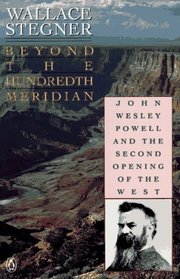Helpful Score: 2
Do not miss this book! It is a very important piece of our Western United States Legacy. It is is not just about John Wesley Powell and his trip down the Colorado River through the might Grand Canyon. (although it is a great read about his adventure and quite a good yarn!) It also ponders the development of the West and some history of it's many explorers and thrillseekers.
If you really want to understand how the West was developed this is a must read.
Stegner was a wonderful writer!
If you really want to understand how the West was developed this is a must read.
Stegner was a wonderful writer!
Rachel S. reviewed Beyond the Hundredth Meridian: John Wesley Powell and the Second Opening of the West on + 10 more book reviews
Helpful Score: 1
I love Wallace Stegner, but just couldn\'t warm up to this. Maybe because it\'s non-fiction. It\'s about Wesley Powell, a geologist who worked to protect the American West. Hope someone else can enjoy this book.
Leo T. reviewed Beyond the Hundredth Meridian: John Wesley Powell and the Second Opening of the West on + 1775 more book reviews
Powell came to "know the West as few men did and understand its problems better (6)." It was considered a desert in Pike's time but Wm. Gilpin described it as a 'Garden of Eden' and part of America's 'Manifest Destiny.'
The author offers a great amount of detail. Powell used a 'lining system;' rather than just running the river.
Stegner notes that Powell joined public service to practice science just as Henry Adams was leaving it because of corruption. JWP was to have his problems in D.C. and with territorial (and later state) governments.
Powell is best known for voyaging down the Colorado River but I would argue that his work in attempting to avoid settlers taking upo land in areas with insufficient rainfall is even more significant. The 20 inch annual rainfall line runs through Missouri and points West experience not only less rainfall but increasingly variable precipitation.
For a short while, Powell obtained Congressional support for a geological survey of the far western lands in order to classify them so that agricultural failures in years of scant rainfall would be avoided by not allowing incongruent uses in the first place. For example, a settler might need 1,000 acres to support his family in an area with rainfall sufficient only for light grazing.
Entries were actually closed under the Homestead Act, leading to a storm of complaints from would be settlers and their representatives. That soon ended this attempt at âscientific' land use. The work was dependent on appropriations to hire hydraulic engineers, engrave maps, etc. Note that the 1890 Congress included several states admitted in 1889.
The author offers a great amount of detail. Powell used a 'lining system;' rather than just running the river.
Stegner notes that Powell joined public service to practice science just as Henry Adams was leaving it because of corruption. JWP was to have his problems in D.C. and with territorial (and later state) governments.
Powell is best known for voyaging down the Colorado River but I would argue that his work in attempting to avoid settlers taking upo land in areas with insufficient rainfall is even more significant. The 20 inch annual rainfall line runs through Missouri and points West experience not only less rainfall but increasingly variable precipitation.
For a short while, Powell obtained Congressional support for a geological survey of the far western lands in order to classify them so that agricultural failures in years of scant rainfall would be avoided by not allowing incongruent uses in the first place. For example, a settler might need 1,000 acres to support his family in an area with rainfall sufficient only for light grazing.
Entries were actually closed under the Homestead Act, leading to a storm of complaints from would be settlers and their representatives. That soon ended this attempt at âscientific' land use. The work was dependent on appropriations to hire hydraulic engineers, engrave maps, etc. Note that the 1890 Congress included several states admitted in 1889.
Frank F. reviewed Beyond the Hundredth Meridian: John Wesley Powell and the Second Opening of the West on + 386 more book reviews
Found this book from reading The Emerald Mile. Powell was the first white guy to do the Grand Canyon. His fame was way more that that. He was responsible for the mapping of the western US plus it use and availability of water for development. First part of book is more interesting, second half is more of the politics he had to deal with.
I had trouble getting into it, although I've liked Stegner's fiction.




![header=[] body=[Get a free book credit right now by joining the club and listing 5 books you have and are willing to share with other members!] Help icon](/images/question.gif?v=90afaeb39)
